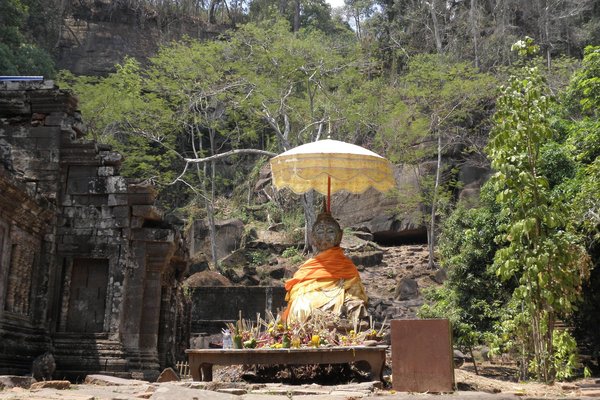Laos
Vat Phou
Vat Phou and Associated Ancient Settlements within the Champasak Cultural Landscape comprise a ruined Khmer Hindu temple complex integrated with its natural surroundings.
The whole was created within a geometric framework linking man-made works with natural phenomena, notably the summit of Phou Kao and the river Mekong. The temple has a unique structure, in which the elements lead to a shrine where a linga was bathed in water from a mountain spring. The site later became a centre of Theravada Buddhist worship, which it remains today.
Community Perspective: this site may be disappointing if you’ve visited major Khmer sites before, but the old processional walkway is impressive. The area also has a surprisingly serene and holy atmosphere. Frederik puts the site in Khmer context, Els visited it on public transport (difficult!) and Nan with a car+driver from Pakse. Randi in 2020 reported the arrival of an electric bus to get around the archeological site.
Site Info
Official Information
- Full Name
- Vat Phou and Associated Ancient Settlements within the Champasak Cultural Landscape (ID: 481)
- Country
- Laos
- Status
-
Inscribed 2001
Site history
History of Vat Phou
- 2001: Inscribed
- Inscribed
- Type
- Cultural
- Criteria
- iii
- iv
- vi
Links
- UNESCO
- whc.unesco.org
- Official
-
- vatphou-champassak.com — Vat Phou Champasak
- Related
-
- travelfish.org — Travel info by TravelFish
All Links
UNESCO.org
- whc.unesco.org — whc.unesco.org/
Official Website
- vatphou-champassak.com — Vat Phou Champasak
Related Resources
- travelfish.org — Travel info by TravelFish
Community Information
- Community Category
- Archaeological site: South (East) Asian
- Cultural Landscape: Associative
Travel Information
Recent Connections
-
Mandala
"Vat Phou temple complex (...) follows …
-
Perfect Inscriptions
2001 -
Shiva cult
"It is focused on, to the west, the nat…
Connections of Vat Phou
- Geography
-
-
Mekong Basin
Vat Phou
-
- History
-
-
Located in a Former Capital
Former capital of Champasak Kingdom -
Khmer Empire
"The Temple Complex of Vat Phou bears exceptional testimony to the cultures of south-east Asia, and in particular to the Khmer Empire which dominated the region in the 10th–14th centuries." (OUV)
-
- Ecology
-
-
Rainforests
Phu Khao mountain is rainforest
-
- Architecture
-
-
Mandala
"Vat Phou temple complex (...) follows an axial planning of the Vastu Purush mandala, visually connecting the mountain top to the river bank in a geometric pattern of temples, shrines and waterworks extending over some 10 km." (Koh Ker Nomination file, p. 62)
-
Built in Laterite
-
- World Heritage Process
-
-
Perfect Inscriptions
2001
-
- Religion and Belief
-
-
Theravada Buddhism
-
Shiva cult
"It is focused on, to the west, the natural features of Phou Kao Mountain and, on the east, the Mekong River, used to represent respectively the sacred mountain dwelling of the god Shiva and the Ganges River or the Universal Ocean." (AB ev) "The elements lead to a shrine where a lingam dedicated to Lord Shiva was bathed in water from a mountain spring." -
Sacred Mountains
Phou Kao mountain -
Hindu Sites in non Hindu countries
"Contrived to express the Hindu version of the relationship between nature and humanity" (OUV) (Cambodia is 96.9% Buddhist)
-
- Human Activity
-
-
Man-made Terraces
Vat Phou Temple (stone terraces attached to the hills forming entraces and temple grounds) -
Irrigation and drainage
Hydraulic system stretching over 10 km -
Human Sacrifice
Crocodile Stone "may have been used as an altar to perform an annual human sacrifice"
-
- WHS on Other Lists
-
-
Global Heritage Fund
Wat Phou
-
- Timeline
-
-
Built in the 11th century
The earliest remains that still can be seen are from the 11th century - major rebuilding was done in the 11th-12th centuries by the rulers of Angkor
-
News
No news.
Recent Visitors
Visitors of Vat Phou
- AC
- Alejandro Lau
- Alexander Parsons
- Alex Goh
- Ali Zingstra
- Atila Ege
- BenReeve
- Bernard Joseph Esposo Guerrero
- Bin
- Boj
- Bram de Bruin
- Bundi Cao
- c82wc1
- Carlo Sarion
- Chalamphol Therakul
- Christravelblog
- CynthiaSam
- David Marton
- Dimitar Krastev
- Els Slots
- Erik Jelinek
- Eva Kisgyorgy
- Fan Yibo
- Frederik Dawson
- George Gdanski
- Harald T.
- henrik_hannfors
- henryjiao18
- hotpickle
- Iain Jackson
- Ivan Rucek
- Jana and Matt
- Janos
- Joel on the Road
- Justin Rickey
- jxrocky
- kamonpetch
- KarenBMoore
- KeithBailey
- Kevin247
- Loic Pedras
- Ludvan
- Luis Filipe Gaspar
- Maciej Gowin
- marcel staron
- Mariam
- Michael Ayers
- Michael Turtle
- Miloš Tašković
- Monica66
- nan
- Nihal Ege
- Patrik
- Paul Schofield
- pete_simms
- Randi Thomsen
- ReallyDeepThoughts
- Reza
- Risson
- Sergio Arjona
- Shandos Cleaver
- sncjob
- Stanislaw Warwas
- Svein Elias
- Szucs Tamas
- Thomas Buechler
- Thomas van der Walt
- Timonator
- Timothy C Easton
- Tinuszke
- Vanessa Buechler
- Westwards
- Wo_ko
- zfish
- Zoë Sheng
Community Reviews
Show full reviews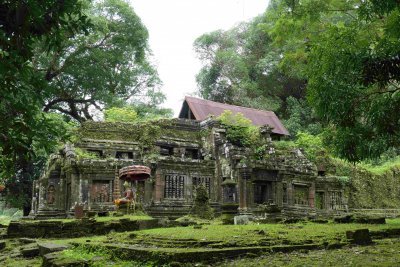
One more review to give a post-Covid view on how things are working today.
The temple lies about 15 km down the road from small town Champasak. I stayed in Champasak after coming from Ayutthaya. I took the night train to Ubon Ratchathani (About 9 hours, slim but comfortable beds with privacy curtain, about 20 USD, arriving at 06:15 a.m.) and then the Bus from Ubon to Pakse at 09:30 a.m. from the bus terminal in Ubon. You have to cross the city to reach the bus terminal from train terminal e.g. by Grab, Tuk Tuk or taxi. The bus waits at the border to Laos keeping the big luaggage inside where I got my 60 day Visa for 40 USD (I was expecting to only get 30 days). The bus reached Pakse bus station at shortly after 12. Basically it depends a bit on the amount of not Thai and Lao people in the bus as only 1 person was working on the Visa on arrivals and the more people are in need of the Visa, the longer it takes. In Pakse I switched to the Songthaew but it was neither easy nor comforable. As indicated by Els it leaves from the market called: "ตลาดดาวเรือง" in Google Maps. More precisely it leaves from close to the big 16W street leading back to Thailand. It´s an important information as I walked around through many alleys of the crowded and labrynthine market until I found it and also local people …
Keep reading 0 comments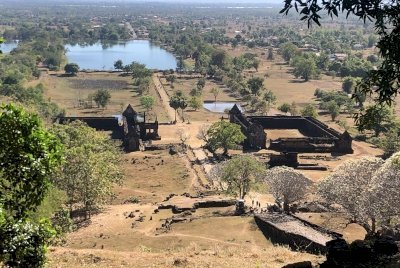
Visit Januar 2020
Yet another Angkor Site, but has it’s own charm. Nice setting in the slopes of the holy mountain.
From the ticket office, there is an electric bus to the site. We got there in the morning, not many tourists and not too hot. The middle section was nice to explore. The main temple requires a few stairs to climb. The main temple has some very nice reliefs. We also went looking for the elephant stone, crocodile stone and the holy spring.
The small museum is also worth a visit though not outstanding.
We opted to stay in a small guesthouse on the riverside of Mekong in Champasak. It is a charming small village. It used to be the seat for the royal family. The river was surprisingly clean. We went swimming in the river on an evening trip to the island Don.
It was great just roaming around in the countryside on a motorbike enjoying the scenery and the friendliness of the lao people.
### Randi & Svein Elias
Keep reading 0 comments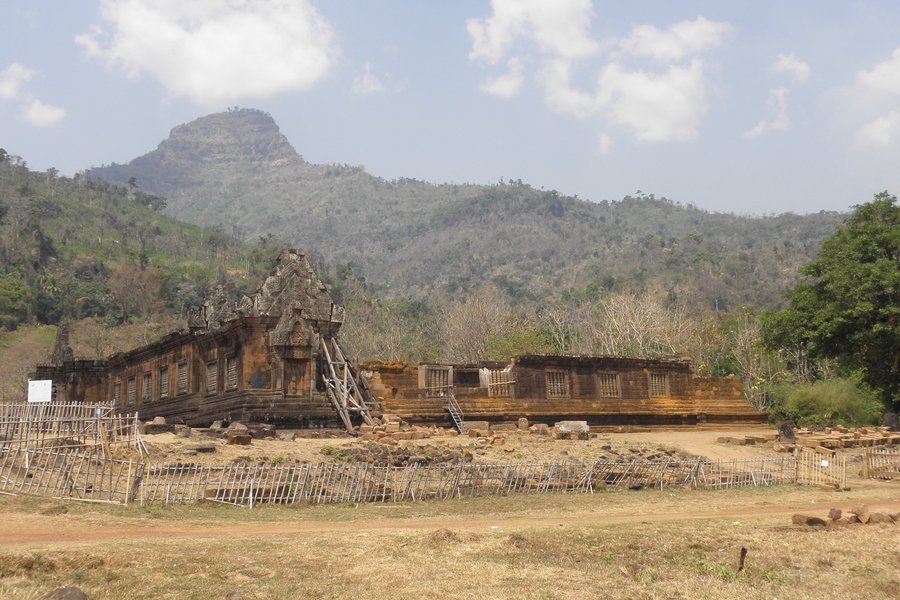
Interesting stop-off between Parke and Don Det if you're travelling north/south through southern Laos. Stretching 1400m up a hillside it is an interesting collection of old temples and had a air conditioned visitor centre and large carpark. The walk up the hill to the top of the site is worth it for some statues and view back over the whole site.
Keep reading 0 comments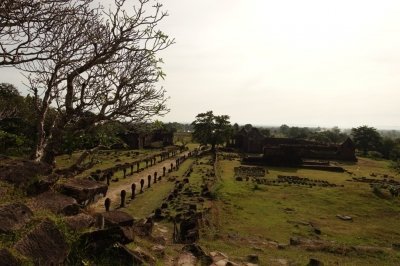
Thanks to Lao Air and their weird flight schedules, I managed to visit Vat Phou during an overlay on my way to Siem Reap (Angkor). I arrived in the evening and stayed in a hotel on the outskirts of Pakse along the Mekong River. From there I went by cab the next morning to the site.
The temple is built along the slopes of a mountain, quite scenic when you approach it. First you pass a long baray. At the end of the baray you arrive at the big temple ruins which boast nice stone works. Climbing plenty of stairs will take you first to the mid and then to the upper level where the holy spring is. As pointed out by Els some steps are downright dangerous as they are way to steep and narrow. You get some great views of the site as you climb.
Around 9 a.m. I had reached the upper level with the spring. In the meantime the temperature had already become unbearable, so instead of roaming around I decided to descend. After a very brief stop in the on site museum (no AC, worse than outside) I headed back to my ride.
There are several other components scattered around the main temple complex, e.g. ruins of an ancient town. Seeing the site is title “Associated Ancient Settlements” my hunch is that these are also part of the inscribed area. The little I read seemed fairly interesting to explore. But …
Keep reading 0 comments
I traveled from Pakse to Vat Phou by motorbike. The countryside was very beautiful and interesting... The villages we passed looked like people were living as they had been living for hundreds of years.
I was fortunate to meet an archeologist in the high complex who was kind enough to show me around and explain the significance of the site. He said this was where the Khmer kings came to be "cleansed" before beginning their reign. So I imagined I was there as a preparation for the big exploration in Cambodia...
Vat Phou itself is small and demure compared to the majesty of the Khmer cities in Cambodia so I recommend seeing Vat Phou first as kind of a preview of things to come in Cambodia.
Keep reading 0 comments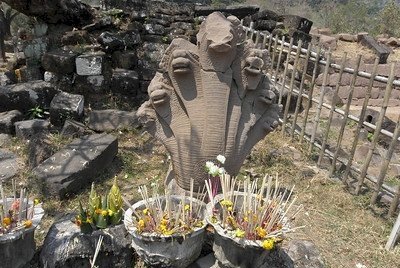
Southern Laos has always been pretty difficult to access. Things are changing here too, however, albeit slowly. I was happy to discover a direct flight from Ho Chi Minh City in Vietnam to Paksé (the main transport hub in South Laos). Lao Airlines started this only last year, and I wonder how long they will continue it as there were only 20 passengers on my flight. Paksé itself feels unbelievably quiet and slow, especially when you’ve just come from Vietnam as I did. You can easily walk in the middle of the streets in the center of the town. A brochure at the Lao Airlines described it accurately: "it's no chaos, it's Laos"!
As I had plenty of time, I decided to give it a try to get to Vat Phou by public transport. Guidebooks and internet fora could not supply me with clear directions on how to do it. So I started out early (before 7 a.m.), looking for a songthaew to Champasak. To cut a long story short: they do exist, but will go only later in the morning when the people from Champasak have finished their selling and shopping at the market of Paksé. I ended up chartering a whole songthaew, together with an Italian guy who was stuck too.
We arrived in Champasak just before 10 o’clock. I hired a bike for the remaining 8 km to Vat Phou. 10 a.m. is already pretty hot in Laos in March. Fortunately, the road is well-paved, …
Keep reading 0 comments
I visited Champasak in 1996 with my family who are originally from there, from a little village called Ban Dou. It was the first time for me and over twenty years for my Mother and Aunt. After arriving in Vientiene, which we stayed with my Uncle's relatives for a few days, we booked a flight down to Pakse which lasted about 45 minutes and then crossed the Mekong River by ferry to Champasak. I have heard they have since built a bridge that connects the two sides and you can now drive across. From there we drove to my mother's village which is about twenty to thirty minutes and is located on the main road, which its name has escaped me. Unfortunately we did not see Vat Phou or toured the main city of Champasak, but stayed in the countryside. It's so beautiful there, the sky is so blue and the clouds are so white and puffy and at night the stars are endless, because there are no bright city lights to shadow them. We stayed in Ban Dou for only two weeks, and for me it felt like it was only a few days. There is so much to take in, by just walking along the main road down to my grandfather's rice patty to walking with a bunch of my cousins down to the little stream and taking a swim. I savored every moment and it would take a book to tell you all the things we saw …
Keep reading 0 comments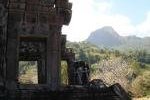
Southern Laos is famous for its cultural diversity and natural beauty especially many beautiful waterfalls, but traveling in this region can not be completed if not visited the 1,500 years old Khmer ruin, Vat Phou, the second Khmer heritage in the World Heritage list.
Vat Phou is very important as it is one of the first stone buildings built by ancient Khmer and served as the main temple of the early capital of Chenla Kingdom which is the predecessor of Angkor Empire in present-day Cambodia, but that was not the main reason made Vat Phou to be accepted by UNESCO. Vat Phou is a part of Champasak Cultural Landscape; the center of the landscape is a lingam-liked mountain. Since ancient Khmer were Hinduism, the lingam-liked mountain had to be regarded as the symbol of god deserved to be worship by constructing the temple for. Moreover behind the temple has spring, the holy water from Lingam Mountain!, with the clever ancient engineering, Champasak people built waterway to let the spring flow pass the small man-made lingam in the main temple building before the spring flow down to the reservoir in front of the temple complex. For ancient pilgrims, Vat Phou was the place where they could receive the blessing from God via the double passed lingam spring (double holy).
I have to admit that after read UNESCO evaluation and other study reports, my imagination on this place go far beyond the reality. Right now, Vat Phou is a ruined complex with …
Keep reading 0 comments
